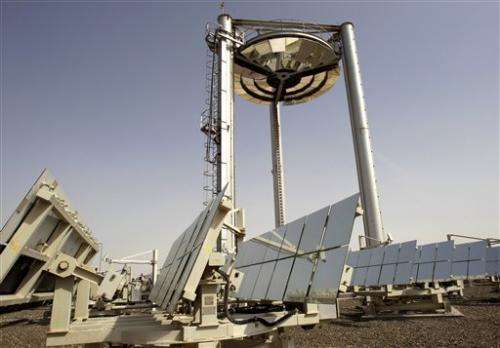UN climate talks go into overtime in Qatar (Update)

(AP)—Nearly 200 countries haggling over how to stop climate change—and how to pay for it—failed to reach a deal on schedule Friday, setting the stage for the wrangling to continue late into the night.
The two-week U.N. conference in Doha was never meant to yield a global climate pact to curb emissions of greenhouse gases—that has been put off until 2015.
But negotiators struggled to agree even on more modest issues, including how to scale up money to help poor countries cope with global warming, and finalizing the extension of an existing treaty that only covers about 15 percent of global emissions.
The U.S. and other developed countries rejected a draft agreement put on the table Friday. Several developing countries also said they couldn't accept the wording of some paragraphs, highlighting the deep divide that has haunted the talks since they first started two decades ago.
One of the key disagreements was over money. Poor countries want firm commitments from rich nations to scale up climate aid for them to $100 billion annually by 2020, a general pledge that was made three years ago.
But rich nations are unwilling to commit to specific targets now, citing world financial turmoil and pressure on their budgets.
"We underscore the need for a goal for 2013-2015 in order to avoid a gap and ensure sufficient financial support for developing countries," Chinese delegate Su Wei told the conference.
The financing issue has overshadowed the talks since they started last week in Qatar, the first Middle Eastern country to host the slow-moving annual negotiations aimed at crafting a global response to climate change.
Rich nations pledged in 2009 to deliver long-term financing to help poor nations switch to clean energy and adapt to rising sea levels and other impacts of global warming. They offered $10 billion a year in 2010-2012 in "fast-start" financing, pledging that the amount would be increased to $100 billion in 2020.
But they didn't say how.
A draft text early Friday urged developed countries "to make firm commitments to provide scaled up climate finance beyond 2012" but didn't include any midterm targets.
"It's troubling that some developing countries, for example the U.S., are very skeptical toward doing anything beyond saying 'we have made a promise of $100 billion by 2020,'" said Norwegian Environment Minister Baard Solhjell.
Norway, largely shielded from Europe's financial crisis because of its offshore oil and gas, favors language that clearly shows that aid figures will gradually go up until 2020.
Gambia delegate Pa Ousman Jarju, representing the least developed countries, said they were still insisting on a midterm financing target but "we have not reached a stage where we would walk out."
Negotiators were also trying to finalize an agreement to formally extend the Kyoto Protocol, an emissions reduction pact for rich countries that expires at the end of this year. One of the sticking points was whether to allow countries to carry over surplus emissions allowances into the next phase.
The U.S. never joined Kyoto while Japan, New Zealand, Canada and Russia don't want to be part of the extension, meaning it would only cover about 15 percent of the world's emissions of greenhouse gases.
Governments have set a deadline of 2015 to agree on a wider deal that would include both developed and developing countries, which now produce a majority of the world's emissions.
The goal of the U.N. talks is to keep temperatures from rising more than 2 C (3.6 F), compared to preindustrial times. Temperatures have already risen about 0.8 C (1.4 F) above that level, according to the latest report by the U.N.'s top climate body.
A recent projection by the World Bank showed temperatures are on track to rise by up to 4 C (7.2 F) by the year 2100.
"There is a huge lag between the international policy response and what science is telling us," U.N. climate chief Christiana Figueres told The Associated Press. "We know that science tends to underestimate the impacts of climate, and so if anything, that gap continues to grow."
Copyright 2012 The Associated Press. All rights reserved. This material may not be published, broadcast, rewritten or redistributed.


















